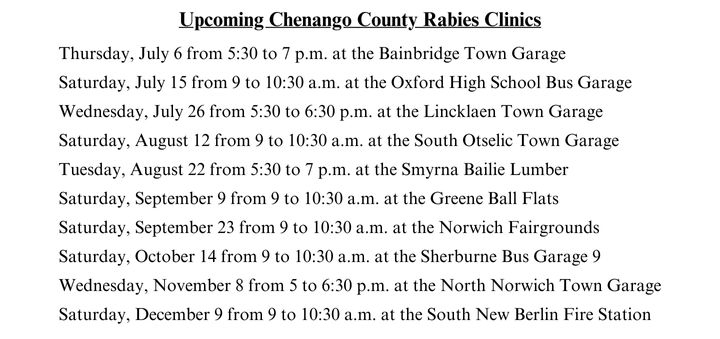Protect Your Pet Against Rabies At Chenango County Clinics
Published:
June 23rd, 2023
By:
Sarah Genter

CHENANGO COUNTY — Dog, cat, and ferret owners have several opportunities this year to protect their pets from rabies with low-cost vaccination clinics throughout Chenango County.
New York State Public Health Rabies Law requires all dogs, cats, and domesticated ferrets to receive immunization against the rabies virus before four months of age. To assist local pet owners, the Chenango County Environmental Health Department offers regular drive-through clinics providing rabies vaccines to county pets for a suggested donation of $5 per animal.
"They are a free vaccine. The most important thing to us is that more pets get vaccinated. Any donation is appreciated and does help offset the cost associated with putting these events on," said Chenango County Director of Public Health Isaiah Sutton.
Pre-registration is required for the clinics. Pet owners can register by visiting health.ny.gov/go2clinic or by calling the Chenango County Environmental Health Department at 607-337-1673.
Dogs must be kept on a leash, and cats and ferrets must be contained in a box, crate, pillow case, or other container. Attendees will be directed through the drive-through to check in, but pets will need to be removed from the vehicle for vaccination.
Passengers in the vehicle should be limited to only those needed to keep the animal under control, and children should be left at home if possible.
Animals receiving their first dose of a rabies vaccine will need to receive a booster the following year. After that, pets should receive a rabies shot every three years. Pet owners should bring their animal's previous vaccination records with them to the clinic to receive a three-year rabies certificate.
Rabies is a virus that presents in animals as weight loss, paralysis, throat swelling, difficulty swallowing, foaming at the mouth, and aggression. Additionally, Sutton said obviously different or unusual behavior can also be a sign of rabies.
"In domestic animals, if your animal acts markedly differently than you expect it to. So a wild animal that will come right up to you, that’s not what you expect out of a raccoon. So that is cause for concern," Sutton explained. "If a normally passive animal becomes quite aggressive without any explanation, also cause for concern, and would bear some additional monitoring or testing."
Rabies is passed between animals through saliva and nervous tissue, Sutton said. The virus could be contracted through animal bites and scratches, or a rabid animal licking an open wound.
Unvaccinated pets who are exposed to rabies must be placed under a strict six-month quarantine for observation, or, depending on the severity of exposure and symptoms, the pet may need to be euthanized.
"For an unvaccinated animal that is exposed to rabies, we either introduce a strict six-month quarantine. That is in a cage in a locked building, so double confined, for a period of six months where we monitor the health, which is very hard for an animal. Some folks it’s not a possibility. In a small apartment it may be hard to keep your dog in a cage in a bedroom," said Sutton. "Depending on the severity of exposure, sometimes euthanization and testing is the more proven option."
"That’s exactly why we have these free clinics: we want to get as many pets as possible vaccinated," he added. "Because if an animal is vaccinated and is exposed, a simple booster after exposure is very successful at protecting against disease."
According to Sutton, humans that are exposed to the rabies virus are given post-exposure treatment, consisting of a series of three to four vaccines administered over several weeks. Timely treatment after exposure is critical, as once symptoms begin, there is no known cure for the fatal virus.
"We like to say that it’s never too late to start [treatment] until someone becomes ill. Once symptoms onset in humans, there is no known treatment," said Sutton. "Rabies is considered a deadly virus. Once someone becomes ill only a handful of success stories, and there’s not really a known medication or treatment therapy that is attributed to those successes."
He urges those who suspect they or their pets have been exposed to rabies to all the Chenango County Environmental Health offices at 607-337-1673 to determine the level of risk and potential treatment options.
"If you see an animal acting strangely, or if you've been scratched, bitten, or your pet has had some contact with an animal, contact our office. At the very least we’d like to have a discussion about that contact, just to determine whether or not there’s any risk, just so we can point folks in the right direction, whether we need to test the wild animal, or start some post-exposure therapy for the person. We can kind of go over what the options are and what the risks are," Sutton explained.
Author: Sarah Genter - More From This Author
Comments






